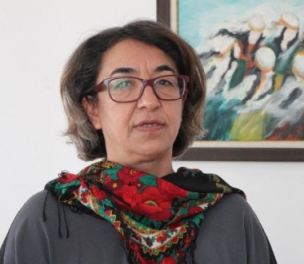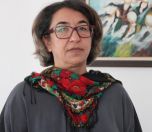Photo: MA
Click to read the article in Turkish
Imprisoned Kurdish politician Ayşe Gökkan has filed a criminal complaint on the allegation of torture and ill-treatment.
Gökkan, former co-mayor of Mardin's Nusaybin district and former spokesperson of the Free Women's Movement (TJA), was transferrd from the Diyarbakır prison to Ankara Sincan Women's Closed Prison in early March. She claims to have been subjected to ill-treatment during her transfer.
Gökkan filed two separate criminal complaints against those responsible with the Ankara Western Prosecutor's Office, Mezopotamya Agency (MA) reported.
In her complaint, Gökkan stated that she was "handcuffed and left breathless for hours" in the prisoner transport van while being taken to the hospital on April 24, and that she was not even allowed to use the restroom. She stated that prison staff used this as a "torture method."
"This torture lasted for 3 and a half hours. I had severe pain in my wrists from the handcuffs and deep wounds," said Gökkan.
Handcuff marks
Gökkan also reported that they were taken back to the prison without receiving treatment and that the torture marks on her wrists were documented in her medical report.
"I demand that legal action be taken against all officials who have applied the handcuff torture, that an effective investigation into abuse of duty and ill-treatment be initiated, and that they be punished," she said.
What happened?
On April 19, the Diyarbakır Regional Court of Justice's 9th Criminal Chamber upheld the 22-year, 6-month prison sentence given to Ayşe Gökkan by the Diyarbakır 9th Heavy Penal Court twice for "being a member of a terrorist organization" and "making terrorist propaganda."
While the verdict was appealed to the Court of Cassation, the reasoned decision for a 3-year, 9-month prison sentence was also announced.
"Sisyphus" and "dystopia"
In the reasoned decision, the abbreviation for the European Committee for the Prevention of Torture (CPT) was given as "CPJ," and the name of the Rosa Women's Association, which was founded in Diyarbakır and named after Rosa Luxemburg, a pioneer of socialist women's movements, was translated into English as "rose."
The reasoned decision attempted to argue against women's struggle by using the concept of "rhetoric," which is derived from the art of impressive and persuasive speech used by the followers of Socrates in ancient Greece in the 5th century BC, and the concept of "palliative," which is used in the medical field for "those in need of continuous care" and was introduced to sociological-philosophical-cultural studies by the South Korean philosopher Byung-Chul Han.
In the decision, which directly targets Ayşe Gökkan's personality and women's struggle, Gökkan's ideas were described as "lies," "racist," "fascist," "inverted," "archaic, corrupted heritage," and a reference was made to the mythological figure Sisyphus as an analogy.
The decision also stated that the women's movement and women's struggle were being depicted as a "dystopia." (NT/VK)




.jpg)

